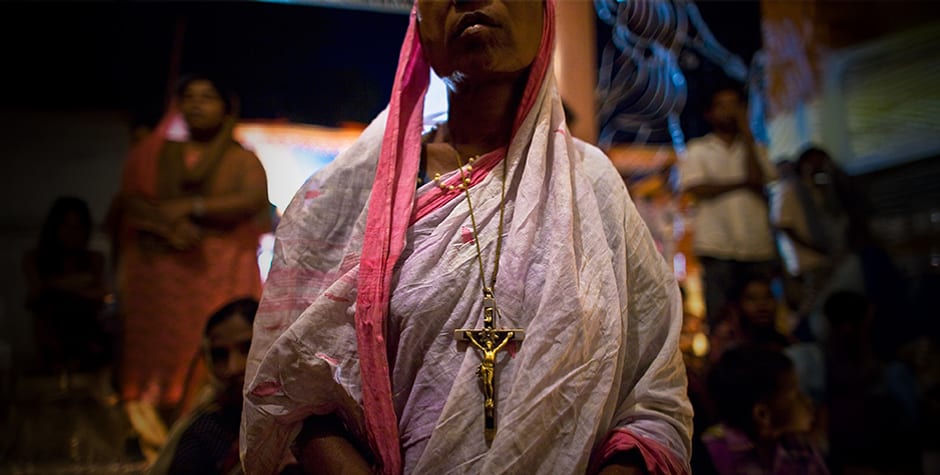Rising Persecution: Christians in India Under Attack by Radical Hindu Movements
Listen tothis article
There has been a disturbing escalation in the persecution of Christians in India. Despite being a minority of 2.3% in a population of 1.4 billion, Christians in India face increasing hostility and violence. This issue is not just about religious intolerance; it’s about the fundamental human rights that are being violated every day.
In recent years, India has witnessed a significant rise in violence against Christians. In 2024, United Christian Forum, an organization focused on protecting human rights in India, reported 834 instances of violence against Christians. This is an increase from the prior year when it reported 601 instances. Sadly, these numbers do not include the instances that remain unreported. However, these numbers represent a stark increase from the 150 incidents recorded in 2014 when Prime Minister Modi came to power. These current attacks range from arson of churches to physical violence, sexual assaults, and even murders.
The rise in anti-Christian violence coincides with the growing influence of Hindu nationalist groups, such as the Rashtriya Swayamsevak Sangh (RSS) and the Bharatiya Janata Party (BJP), both of which Modi is a member. These groups have been accused of inciting violence and exploiting communal tensions for political gain, as they shamefully portray Christians as a threat to Hindu culture and society. The agenda of the RSS and BJP concerning Christians in India is part of their broader strategy to promote Hindu nationalism and marginalize religious minorities. This has led to a significant increase in violence and discrimination against Christians in recent years.
Some may believe that the Hindu nationalism agenda is just a few low-lying bad actors in government; unfortunately, Prime Minister Modi himself has ties to the BJP and RSS, and they are rather deep ties.
Modi joined the RSS in his youth, participating in its activities and adopting its ideology. The RSS has had a significant influence on Modi’s political career and policies. And even as Prime Minister, he maintains close ties with the RSS. Modi also became a member of the BJP. Modi held various positions within the BJP, including serving as the Chief Minister of Gujarat from 2001 to 2014. Let’s not forget that Modi oversaw Gujarat during the riots of 2002, and many have argued that he was complicit in the violence that is frequently referred to as the Gujarat Genocide. Nonetheless, when Modi became the Prime Minister of India in 2014, he led the BJP to a significant electoral victory.
Motivated by the RSS and BJP, one of the most troubling ways the government achieves its Hindu nationalism agenda is the use of anti-conversion laws. These laws, enacted in several states under the BJP’s rule, are ostensibly designed to prevent forced conversions. However, they are often used to target Christians, criminalizing legitimate religious activities and leading to the arrest and harassment of clergy members and other Christians. In Uttar Pradesh, for example, the law prohibits conversion by “misrepresentation, force, undue influence, coercion, allurement, or by any fraudulent means,” which is a definition broad enough to encompass almost any form of religious outreach or practice.
The impact of these laws and the violence they incite is profound. Christians in India face not only physical attacks but also social ostracism. They are denied access to government benefits available to Hindus, and, in some cases, they are even barred from drinking the same water or burying their dead in the community. This systemic discrimination perpetuates historic injustices and undermines the constitutional protections meant to ensure religious freedom.
India’s constitution guarantees freedom of religion and prohibits discrimination based on religion. The preamble declares India a secular state, and Articles 25 to 28 ensure that every citizen has the right to practice and promote their religion peacefully. Despite these constitutional protections, the reality on the ground tells a different story.
Additionally, Prime Minister Modi has made statements emphasizing religious tolerance and the importance of respecting all faiths. In a speech in 2015, he said, “Everyone has the undeniable right to retain or adopt the religion of his or her choice, without coercion or undue influence.” He also emphasized that “unity strengthens us, division weakens us.” However, the actions of his government and the rhetoric of Hindu nationalist groups often contradict these statements, leading to an increase in hate speech and attacks on religious minorities.
The involvement of the BJP and RSS in the persecution of Christians is well-documented. The RSS, as the ideological mentor of the BJP, has been accused of inciting violence against Christians and other religious minorities. In October 2021, Mohan Bhagwat, the head of the RSS, made a speech warning Hindus about religious conversions and alleged “demographic changes” in India’s northeastern states that have a large Christian population. This speech was followed by a series of violent attacks on Christians and churches across India.
The situation is particularly dire in states like Uttar Pradesh and Chhattisgarh, where the number of incidents targeting Christians is alarmingly high. In Manipur, the crisis has reached a critical point, with hundreds of lives lost, church buildings destroyed, and tens of thousands of people displaced.
As we reflect on these troubling developments, it is crucial to remember that the persecution of Christians in India is not just a religious issue; it is a human rights issue. It is a call to action for all of us to stand up for the principles of religious freedom and equality. We must demand that the Indian government take concrete steps to protect its Christian citizens and ensure that their rights are respected.
The persecution of Christians in India is a stark reminder of the challenges we face in promoting religious tolerance and human rights. It is a reminder that our work is far from over and that we must continue to advocate for justice and equality for all.
*The above remarks were delivered by ACLJ Senior Counsel CeCe Heil before the United Nations in Geneva, Switzerland, on March 19.
